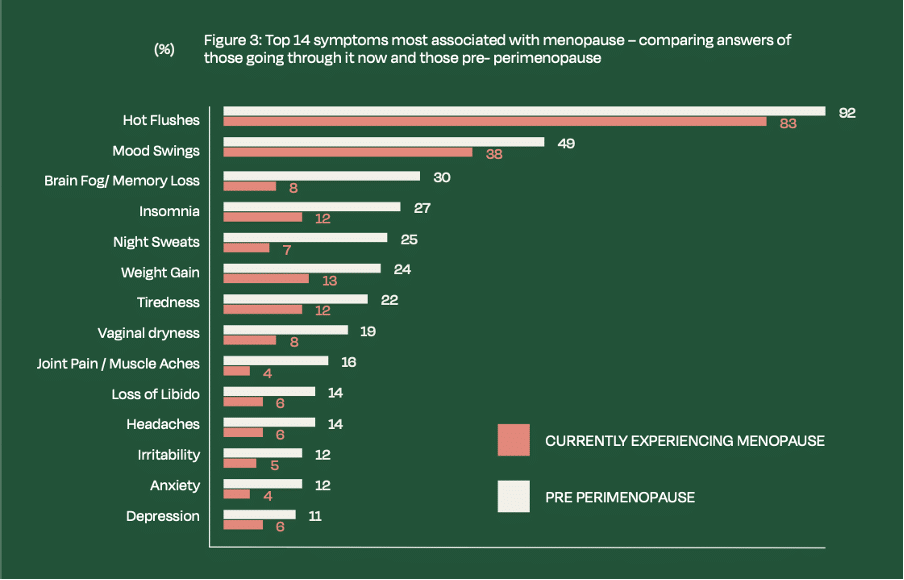Written by Anna Kallianteri, RD, BSc, MSc, Lead Dietitian
Menopause is a natural phase in any woman’s life that marks the end of her menstrual cycles and reproductive years.
Most women experience menopause between the age of 45 to 55, followed by perimenopause (menopausal transition), the stage where the first signs of period absence start. Menopause can be officially marked after 1 year without any menstruation.
With greater awareness and research into women’s health every year, women going through the menopause are getting more support than ever. Although considering that 1.1 billion women will be postmenopausal by 2025 (1), there is a long way to go.
Read on to understand more about the menopause and managing your symptoms.
Menopause Statistics that will blow your mind
- In the UK the average age for menopause is 51 (2). But around one in 100 women experience the menopause before 40 years of age.
- On average, most symptoms last around 4 years from when a woman’s periods end, however, around 1 in every 10 women experience them for up to 12 years (2).
- 1 in 2 women in Great Britain, aged 45-65 years, go through menopause without consulting a medical professional (3)
- A UCL led study has found 94% of postmenopausal women were never taught about menopause I school and over 60% of women only researched about menopause when symptoms started (4).
What is Menopause?
Menopause happens when your ovaries stop releasing eggs, your periods stop for a consecutive 12 month period, and your hormone levels drop, especially oestrogen, progesterone, and testosterone.
Menopause is often a natural process. However, it can also occur after a surgical procedure such as a hysterectomy or can be caused after treatment for certain conditions such as endometriosis and breast cancer.
Symptoms of Menopause and Perimenopause
The symptoms experienced during menopause can vary significantly from a woman to another, both in terms of severity but also quantity and duration during and after the menopausal transition. Of the most common, associated symptoms that range from physical, emotional, mental, can include:
- hot flushes and night sweats (sometimes followed by chills)
- vaginal dryness
- General tiredness/fatigue
- sleep disturbances/insomnia
- joint and muscular aches
- skin irritation
- mood swings, anxiety and/or depression
- poor concentration
- Those who don’t experience the more obvious symptoms will all still undergo physiological changes that will have an impact on their health (e.g. heart disease, bone density and osteoporosis).

Top 14 symptoms most associated with menopause (5).
Menopause: Common Questions Awnsered
Why do some women gain belly fat?
As soon as the transition to a menopausal stage occurs in a woman’s life, her oestrogen levels drop. This drop is linked with an overall increase of fat mass and a redistribution of fat from subcutaneous (under the skin) to abdominal. There is also more available testosterone as the oestrogen levels drop with menopause, that increases of body fat around the belly.
What can low oestrogen levels mean for your long-term health?
There is an association between lower oestrogen levels with menopause and long-term health risk and complications. As the lipid profile changes, women are at greater risk for cardiovascular disease, Type 2 Diabetes (due to insulin resistance) and certain types of cancer. Also, the oestrogen decline adds to the natural bone loss process that comes with age and during menopause this translates to 3%-5% of increased bone loss per year for 5-7 years (6).
How can lifestyle help manage symptoms of menopause?
Eating well, incorporating exercise and taking care of your mental health will all help you manage and offer a relief from some symptoms associated with menopause.
- Nutrition: Eating a balanced diet rich in antioxidants, with plenty of fruits, vegetables, whole grains, and lean proteins can help manage weight and support overall health. Some women find that reducing caffeine, alcohol, and spicy foods can alleviate hot flashes and night sweats.
- Regular Exercise: Engaging in regular physical activity can help manage weight, improve mood, and promote better sleep. An average 150 mins of cardiovascular training every week, supports heart health. And when in combination with weight-bearing exercises can also boost your metabolism, keep you stronger and prevent a natural decline in bone mass that comes with menopause.
- Stress Management: High stress levels can exacerbate menopausal symptoms, so practices like yoga, meditation, deep breathing exercises and mindfulness can help manage your stress levels overall.
- Adequate Sleep: Establishing good sleep habits is crucial. Create a comfortable sleep environment, maintain a regular sleep schedule, and limit caffeine and screen time before bedtime for optimal sleep hygiene.
- Limit Smoking and Alcohol: Reducing or quitting smoking and moderating alcohol consumption can have positive effects on menopausal symptoms and overall health. Quitting smoking is also key for women that consider starting on hormone replacement therapy (HRT) on top of the lifestyle modifications.
So how can you manage symptoms of menopause?
Despite the increased awareness and research in women’s health, all women experience menopause at some time in their lives, highlighting the ongoing need for support and education. We define menopause as the year following the last menstrual cycle, characterised by hormonal changes and the cessation of periods, with notable hormonal fluctuations. Outlining the wide spectrum of menopausal symptoms, we share the significance of support and management, including lifestyle changes.
There are different lifestyle modifications that can assist in the management of a woman’s symptoms, such as maintaining a healthy diet and regular activity levels, stress reduction, quality sleep and the moderation of smoking and alcohol. At Uniquely Health, our clinical team can provide guidance and support for women navigating the challenges of menopause to enhance their overall well-being.
Key Conclusions
1. Menopause is a natural phase in any woman’s life that marks the end of her menstrual cycles and reproductive years commonly occurring at 45-55 years old.
2. Hormone changes relating to menopause can increase belly fat and increase the risk of some health complications.
3. Menopause can come with some unpleasant symptoms that lifestyle modifications can help relieve, such as eating a balanced diet, regular movement, stress reduction, better sleep and moderation of substances.
If you are looking for support in managing hormonal changes, book a complimentary call with our team to discuss how we can help you.
- Al-Safi, Z.A. and Santoro, N., 2014. Menopausal hormone therapy and menopausal symptoms. Fertility and sterility, 101 (4), pp.905-915.
- NHS. Available at: https://www.nhsinform.scot/healthy-living/womens-health/later-years-around-50-years-and-over/menopause-and-post-menopause-health/menopause/
- Womens Health Concern. Menopause in the Workplace Survey. Available at: https://www.womens-health-concern.org/help-and-advice/menopause-in-the-workplace/
Aljumah, R., Phillips, S. and Harper, J.C., 2023. An online survey of postmenopausal women to determine their attitudes and knowledge of the menopause. Post Reproductive Health, p.20533691231166543.
Generation Menopause. 2021. Invisibility Report. Available at: https://gen-m.com/insight/
- Peacock, K., Ketvertis, K.M. and Doerr, C., 2021. Menopause (Nursing).









